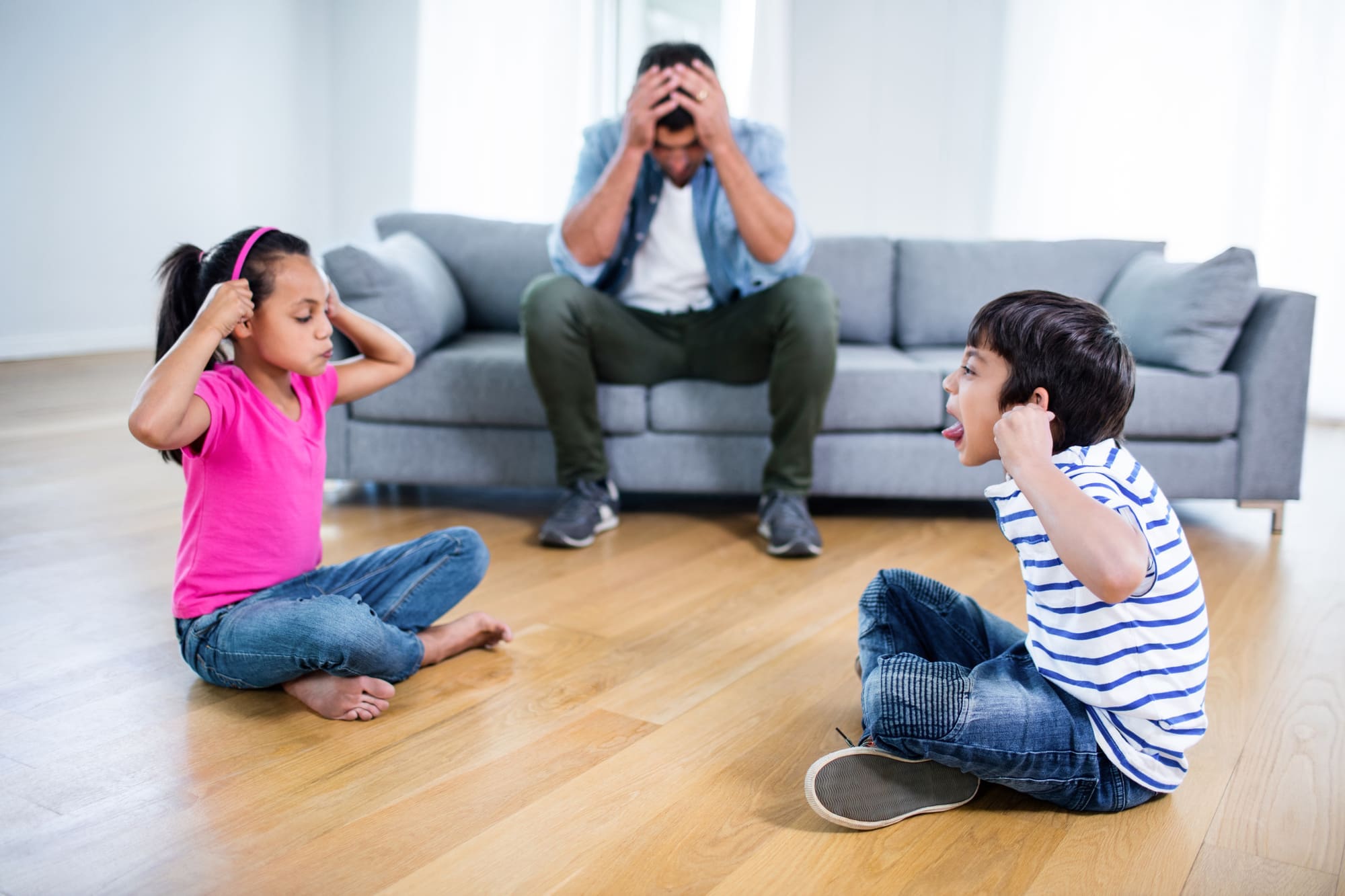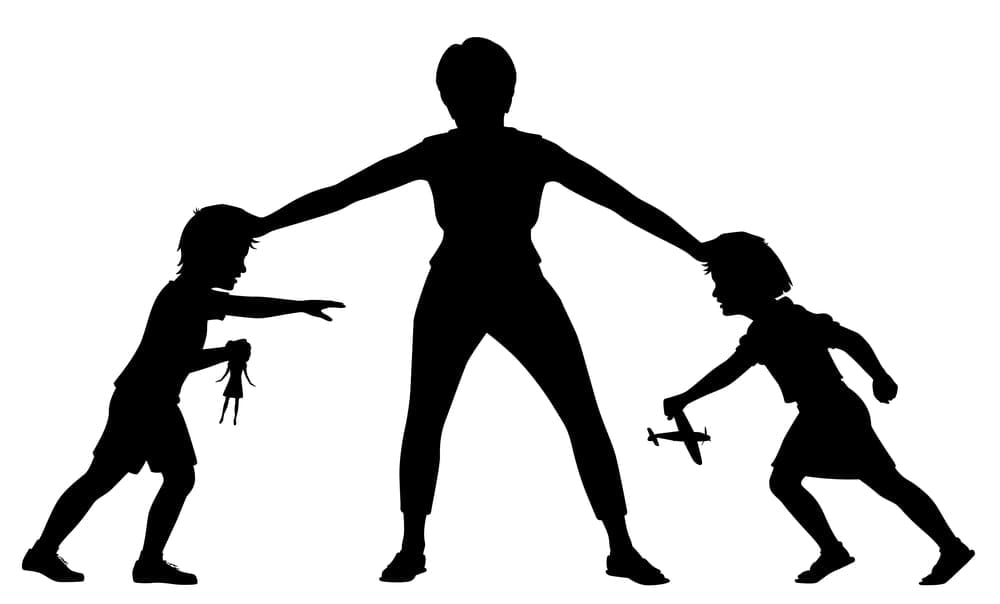Kids Fighting? How To Keep The Peace

If you have been blessed with more than one child, you have invariably also witnessed some form of fighting and arguing among your children. Your daughter may lash out and hit her big brother. Or maybe your son yells at his younger sister and then snaps the head off one of her dolls.
“Be nice to your sister,” you plead.
“Play gently!” you yell.
Despite a parent’s best efforts, fighting between siblings is a natural part of growing up. All parents pray that the relationship between their children is strong, loving and respectful, but disagreements are unavoidable between siblings.
Children are likely to fight over toys and tease one another. They may be best friends one minute and enemies the next. In fact, the nicer you ask them to be to each other, the more belligerent they become.
Don’t you wish you knew how to get your kids to stop fighting? Keep these tips handy along with a cool head and this summer vacation will be a breeze, insh’Allah.

Be Prepared
LET THEM KNOW HOW YOU FEEL ABOUT FIGHTING
Sit down and have a family discussion on the family rules in your home. Let your children know what the consequences will be if they break the rules. Rules should be few, fair, easy to follow, enforceable, and positively stated (for example, Use your manners, respect your sister’s toys, ask permission before you take something that’s not yours.)
HAVE REALISTIC EXPECTATIONS
All children misbehave and fight at times, and it is inevitable that you will have some discipline challenges. Trying to be the perfect parent and expecting perfectly behaved children can set you up for frustration and disappointment.
PAY ATTENTION TO YOUR CHILDREN
If they do not receive positive attention from family, they may choose to seek out negative attention. This is because negative attention is still attention, and any attention is better than being ignored. Put your phone aside and remember to communicate with your child looking them in the eye when you talk to them. Give your child lots of nurturing physical attention – children like hugs, cuddles and holding hands.
LOOK AFTER YOURSELF
It is difficult to be a calm, relaxed parent if you are stressed, feeling anxious or down. Try to find time every week to let yourself unwind or do something that you enjoy. I know as parents it is difficult to do, but give yourself permission to take time for yourself.
PROVIDE FUN ACTIVITIES
Children are more likely to misbehave and fight when they are bored, so provide lots of age-appropriate engaging indoor and outdoor activities for your child such as play dough, coloring, cardboard boxes, dress ups, blanket tents, etc.
PARENT BY EXAMPLE
(Model what you expect) Think of your kids like copy machine who will mimic everything you do. If you make poor choices in behavior, you are giving them permission to act in the same ways. Check in with yourself, and don’t lose it in front of the children.

When They Fight…
1. Keep your cool
If your child misbehaves, stay calm and give them clear instructions to stop misbehaving.
Redirect them to a different way to behave and praise them if they listen to you. For example, “Stop throwing your cars. Play with them on the ground please.“
Use specific praise with your child if they stop, for example, “Isn’t it so much more fun to play with your cars like this? Thank you for listening to me.”
2. Let off steam & show understanding
Allow them to vent and get their bad emotions out. Repeat to them how they are feeling and show you understand how frustrating it can be. “Yasir, you feel like Qasim wronged you, and Qasim, you feel that Yasir is being unfair… This sounds like something both of you can work out. You’re big boys, and I expect you to come out of this bedroom as friends.”
Only when your children are able to express their anger/hurt and feel acknowledged by you, can they stop fighting, and begin to calm themselves and move on.
3. Stay neutral when they fight
Avoid negative emotional reactions, such as anger, sarcasm, and ridicule. It’s important to remember to criticize your child’s behavior, NOT the child himself. Saying something like, “I know you are a kind person, but the way you are behaving is really hurting your sister’s feelings. How else do you think you could have asked for that toy?”
4. Parent positively
Punishing a child is not as effective as using praise and rewards. Rather than focusing on weaknesses, find ways to assist your child in developing to his or her full potential. When you praise your child on their efforts of being polite, sharing, taking turns, being kind and caring, you are encouraging them to behave even better. If you need to have a strong talk with your child about their behavior, do it alone in a quiet, private place. Scolding him in front of another child can lead to embarrassment which can lead to more fighting.
5. Evaluate whether you need to step in
You may have to step in and settle a spat between toddlers or preschoolers, but older children will probably settle an argument themselves if left alone. If your children try to involve you don’t take sides, but instead reiterate the problem and state your confidence that together they are capable enough to come up with a compromising solution.
Use these times as teachable moments to reaffirm your family values and your expectations of you want them to treat each other. Kids with very different personalities need guidance to learn how to successfully coexist.
6. No violence or bullying is every allowed
Children will go from being best friends to each other’s greatest enemies in minutes. Make sure your children are made aware that you will not stand for any violence between them.
PRAISE your children when they solve their arguments peacefully. Enforce a zero tolerance policy on physical AND emotional bullying, which can have long lasting psychological effects.
Separate the children who are engaged in such an interaction and do your best to calm everyone down. Show them alternatives ways of handling differences. Give your children time and space to vent their anger and frustration then listen to both sides. Encourage them to brainstorm ideas with you so they can avoid such a problem again.
You Can Do It!!
Bear in mind that while one strategy may work really well for one child, it may have zero effect on another. Use your knowledge and understanding of your child’s personality to adjust the most suitable strategy that can work for your children. Don’t give up on your child, ever! All of your child’s problems can be worked through with humor, goodwill, and perseverance. With proper parental support, even the most troublesome teens can become amazing people.
When we make the effort to parent in a positive way and incorporate compassion and kindness into our daily interactions, we are going to have much better outcomes and the whole family is going to be happier and healthier.

